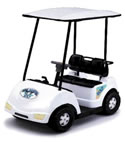 There are roughly 9,000 golf cart related accidents requiring emergency room treatment in the United States each year. The majority of these accidents are related to either braking, cart rollover or passenger ejection. These problems are common to golf carts due to their open design, lack of seatbelts, poor braking capabilities and the uneven terrains they are driven on. Although industry standards prohibit golf carts from exceeding a maximum speed of 15 mph, rollovers and ejections still occur due to sharp turns, steep inclines, mechanical failures and driver error. In addition, most golf carts are equipped with mechanical rear brakes only, significantly limiting their stopping ability.
There are roughly 9,000 golf cart related accidents requiring emergency room treatment in the United States each year. The majority of these accidents are related to either braking, cart rollover or passenger ejection. These problems are common to golf carts due to their open design, lack of seatbelts, poor braking capabilities and the uneven terrains they are driven on. Although industry standards prohibit golf carts from exceeding a maximum speed of 15 mph, rollovers and ejections still occur due to sharp turns, steep inclines, mechanical failures and driver error. In addition, most golf carts are equipped with mechanical rear brakes only, significantly limiting their stopping ability.
Expertise
We have extensive experience in many aspects of golf cart accidents including:
- Rollover stability
- Braking and brake failure analysis
- Occupant ejection issues including grab bars and warnings
- ANSI standard testing
Questions Answered
Through scientific analysis, we can help you answer pertinent questions such as:
- Why did the cart roll over?
- Could passenger ejection have been prevented by a grab bar?
- Was the cart path too steep and curved?
Case Examples
Passenger Ejection:
Two men were riding through a paved golf course parking lot when the driver made a sudden left turn and the passenger was ejected from the vehicle, sustaining severe head injuries. We demonstrated that when the cart was turned as sharply as possible at its maximum speed, the g side forces were sufficient to eject the passenger. We also faulted the manufacturer for failing to provide readily accessible hand-holds and warning labels as required in the ANSI golf cart standard.
Golf Cart Rollover:
A golf cart driver was traveling down a steep golf course path when his vehicle began to accelerate uncontrollably. The cart left the path and rolled over, crushing the driver. Inspections revealed no brake failure. We showed that as designed, even properly functioning brakes could not have slowed the cart on the steep hill. We also demonstrated that the speed governor must have malfunctioned, since the cart could not have rolled over unless it reached speeds well over the designed maximum.
Kristopher J. Seluga, PE, is a Mechanical Engineering, Accident Reconstruction, Biomechanics, and Safety Expert with over 20 years of experience. He received his Bachelor's and Master's degrees from the Mechanical Engineering department at MIT where he worked on the development of novel three-dimensional printing technologies. Mr. Seluga is also a licensed Professional Engineer in New York and Connecticut, and has served as a member of the ANSI engineering committee for the Z130.1 and Z135 standards for golf cars and PTV's. His research interests and peer reviewed publications span the topics of Motor Vehicle Dynamics, Product Safety, and Biomechanics.
©Copyright - All Rights Reserved
DO NOT REPRODUCE WITHOUT WRITTEN PERMISSION BY AUTHOR.



 There are roughly 9,000 golf cart related accidents requiring emergency room treatment in the United States each year. The majority of these accidents are related to either braking, cart rollover or passenger ejection. These problems are common to golf carts due to their open design, lack of seatbelts, poor braking capabilities and the uneven terrains they are driven on. Although industry standards prohibit golf carts from exceeding a maximum speed of 15 mph, rollovers and ejections still occur due to sharp turns, steep inclines, mechanical failures and driver error. In addition, most golf carts are equipped with mechanical rear brakes only, significantly limiting their stopping ability.
There are roughly 9,000 golf cart related accidents requiring emergency room treatment in the United States each year. The majority of these accidents are related to either braking, cart rollover or passenger ejection. These problems are common to golf carts due to their open design, lack of seatbelts, poor braking capabilities and the uneven terrains they are driven on. Although industry standards prohibit golf carts from exceeding a maximum speed of 15 mph, rollovers and ejections still occur due to sharp turns, steep inclines, mechanical failures and driver error. In addition, most golf carts are equipped with mechanical rear brakes only, significantly limiting their stopping ability.







